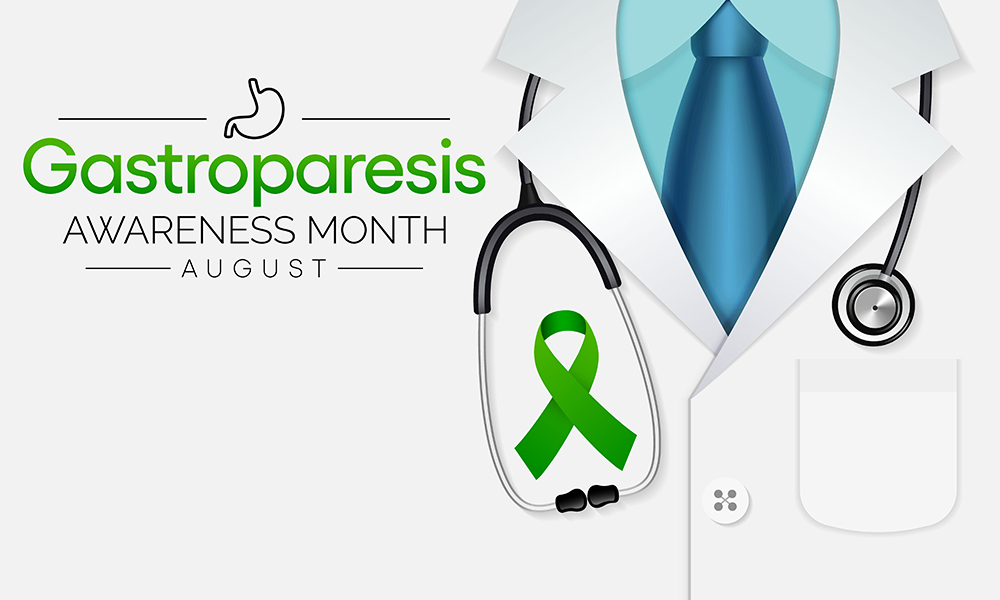
August is a special month for many reasons, one of which is Gastroparesis Awareness Month. Gastroparesis is a chronic medical condition that affects millions of people worldwide, yet it remains relatively unknown to the general public. This month is dedicated to raising awareness about gastroparesis, educating people about its symptoms, causes, and available treatments, and offering support to those who live with this challenging condition every day.
Understanding Gastroparesis
Gastroparesis is a gastrointestinal disorder characterized by delayed emptying of the stomach contents into the small intestine. In a healthy digestive system, the muscles of the stomach contract to move food and liquids into the small intestine for further digestion and absorption. However, in people with gastroparesis, these stomach muscles don’t function properly, causing a range of uncomfortable and sometimes debilitating symptoms.
Symptoms of Gastroparesis
Gastroparesis can manifest with a variety of symptoms, including:
Nausea and Vomiting: Feeling nauseous or vomiting, especially after eating, is common for individuals with gastroparesis.
Abdominal Pain: Patients often experience abdominal discomfort, sometimes described as a gnawing or burning sensation.
Bloating: The stomach may become distended due to delayed emptying, leading to abdominal bloating and discomfort.
Feeling Full Quickly: Individuals with gastroparesis may feel full after eating only a small amount of food.
Weight Loss: Unintended weight loss can occur because of reduced food intake.
Nutritional Deficiencies: Malnutrition can be a concern since food is not properly absorbed.
Causes of Gastroparesis
While the exact cause of gastroparesis is not always clear, several factors can contribute to its development:
Diabetes: Diabetic gastroparesis is one of the most common forms of the condition and is linked to nerve damage caused by high blood sugar levels.
Post-Surgical: Some surgeries, particularly those involving the stomach or vagus nerve, can result in gastroparesis.
Viral Infections: Certain viral infections can affect the nerves controlling stomach muscles.
Medications: Some medications, such as certain antidepressants and opioids, can slow down stomach emptying.
Idiopathic: In some cases, no specific cause can be identified, leading to what’s known as idiopathic gastroparesis.
Exploring Treatment Options for Gastroparesis
Gastroparesis, with its array of challenging symptoms, calls for a comprehensive approach to treatment. While there is no one-size-fits-all solution, a combination of strategies can help manage the condition and improve the quality of life for those affected. As we delve into Gastroparesis Awareness Month, it’s essential to highlight the various treatment options available to individuals living with gastroparesis.
1. Dietary Modifications
One of the first lines of defense against gastroparesis symptoms involves making dietary adjustments. Patients are often advised to eat smaller, more frequent meals to alleviate the burden on the stomach. Foods that are easier to digest, such as well-cooked vegetables, lean proteins, and low-fat options, are often recommended. Avoiding high-fat, high-fiber, and overly spicy foods can help reduce symptoms like bloating and nausea.
2. Medications
Several medications can be prescribed to manage the symptoms of gastroparesis. Prokinetic agents, such as metoclopramide and domperidone, work by enhancing the movement of food through the digestive tract. Anti-nausea medications can also provide relief from feelings of queasiness.
3. Feeding Tubes
In severe cases where oral intake is inadequate, feeding tubes may be recommended. These tubes can deliver liquid nutrition directly into the small intestine, bypassing the stomach and reducing the strain on its compromised muscles.
4. Botulinum Toxin Injections
In certain situations, injections of botulinum toxin (Botox) can be administered into the pyloric sphincter, which is the muscle that separates the stomach from the small intestine. This can help relax the muscles and improve stomach emptying.
5. Electrical Stimulation
Gastric electrical stimulation is a promising treatment option for some individuals with gastroparesis. This involves the implantation of a device that delivers electrical pulses to the stomach, helping to regulate its contractions and improve motility.
6. Lifestyle Modifications
Maintaining a healthy lifestyle can also play a role in managing gastroparesis. Stress management techniques, regular exercise, and staying hydrated can all contribute to overall well-being and potentially alleviate symptoms.
7. Collaborative Approach
Gastroparesis treatment often requires a collaborative effort between patients, healthcare providers, and specialists. Gastroenterologists, dietitians, nutritionists, and mental health professionals can all contribute to developing a personalized treatment plan that addresses the unique needs of each individual.
Raising Awareness
Gastroparesis Awareness Month is a crucial opportunity to educate the public and healthcare professionals about this condition. Awareness campaigns aim to:
Highlight the Prevalence: Many people are unaware of how common gastroparesis is and the impact it can have on daily life.
Emphasize Early Diagnosis: Early diagnosis and intervention can significantly improve a patient’s quality of life.
Promote Research: Continued research is vital for understanding the causes and finding more effective treatments for gastroparesis.
Offer Support: Creating a supportive community for individuals living with gastroparesis and their caregivers is essential for managing this chronic condition.
Support and Resources
It is crucial to seek support and information if you or someone you know has gastroparesis. Organizations like the Gastroparesis Patient Association for Cures and Treatments (G-PACT) and the International Foundation for Gastrointestinal Disorders (IFFGD) offer valuable resources, including educational materials, support groups, and opportunities to get involved in advocacy efforts.
MCR Health’s Commitment
Gastroparesis Awareness Month serves as a reminder that this condition affects many individuals and their families, often causing substantial physical and emotional challenges. By raising awareness, promoting research, and providing support, we can take steps towards improving the lives of those living with gastroparesis and working towards better treatments and, ultimately, a cure. If you or someone you know is experiencing symptoms of gastroparesis, don’t hesitate to reach out to a healthcare professional for guidance and support. By working together, we can improve the lives of those who suffer from gastroparesis.

